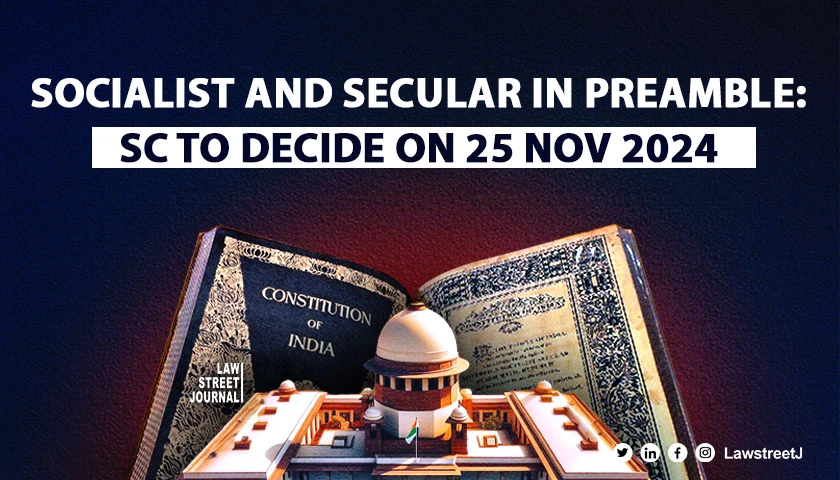New Delhi: The Supreme Court on Friday (November 2022) reserved its verdict on a batch of petitions contesting the inclusion of the terms “socialist” and “secular” in the Preamble of the Constitution via the 42nd Amendment in 1976.
A bench comprising Chief Justice of India Sanjiv Khanna and Justice Sanjay Kumar, after hearing the matter, declined the petitioners’ plea to refer it to a larger bench. Although CJI Khanna was prepared to dictate the order, interruptions from certain lawyers led him to defer the pronouncement to Monday.
Supreme Court to Rule on ‘Socialist’ and ‘Secular’ Inclusion in Preamble
The petitions were filed by Balram Singh, senior BJP leader Dr. Subramanian Swamy, and Advocate Ashwini Kumar Upadhyay.
Advocate Vishnu Shankar Jain, representing one of the petitioners, referenced a recent 9-judge bench decision on Article 39(b) of the Constitution, where the majority, led by the then CJI DY Chandrachud, had disagreed with the socialistic interpretations of Justices Krishna Iyer and Chinnappa Reddy.
In response, CJI Khanna remarked that “socialism” in the Indian context is understood as a “welfare state.”
“The way we understand socialism in India is very different from other countries. In our context, socialism primarily means a welfare state. That is all. It has never prevented the private sector, which is thriving well. We have all benefited from it. The word socialism is used in a different context, meaning that the State is a welfare state and must stand for the welfare of the people and shall provide equality of opportunities,” CJI Khanna explained.
Regarding “secularism,” CJI noted that it has been deemed a part of the Constitution’s basic structure, citing the SR Bommai case.
Jain argued that the amendment was passed during the Emergency without consulting the people, making it an imposition of ideologies. He questioned how the Preamble, having a cut-off date, could have words added later and insisted that the matter be heard by a larger bench. The CJI, however, rejected the request outright, saying, “No, no.”
Advocate Ashwini Upadhyay clarified that while he did not oppose the ideas of socialism and secularism, he objected to their “illegal” insertion into the Preamble.
CJI Khanna countered that the amendment power under Article 368 extends to the Preamble. “The preamble is part and parcel of the Constitution. It is not separate,” he stated. The CJI further clarified that the Court would not revisit arguments about whether the extended tenure of the Lok Sabha in 1976 could amend the Constitution, as the subject amendment had already undergone significant judicial and legislative scrutiny.
Next Hearing on Preamble Challenge Set for 25 November 2024
“The subject amendment (42nd amendment) has been subjected to a lot of judicial review by this Court. The legislature has intervened. The Parliament has intervened. We cannot say that whatever Parliament did at that time (emergency) is nullified,” CJI said.
Upadhyay argued that the amendment was not ratified by the states and urged the Court to seek the opinions of the Attorney General and the Solicitor General.
Dr. Subramanian Swamy, appearing as a party-in-person, pointed out that the Janata Party-led Parliament elected after the Emergency had also supported the inclusion of these terms. He proposed adding the words as a separate paragraph to the Preamble, rather than asserting they were part of the original 1949 adoption.
“I may add that not only the Emergency Parliament adopted this but was subsequently supported by the Janata Party Government’s Parliament also by 2/3rd majority, in which this particular aspect of socialism and secularism was retained. This issue is here only this much - whether we would make out that this should come as a separate paragraph because we cannot say that in 1949 this was adopted. Therefore, the only issue that remains is, having accepted this, we can have a separate paragraph below the original paragraph, that’s all I would submit,” Swamy stated.
When an intervenor attempted to make submissions, the CJI pointed out that the bench had not even issued notice on the petitions. Due to persistent interruptions, the CJI postponed the pronouncement to Monday.
“List on Monday for orders,” CJI said. Jain requested, “Please do not dismiss it. Please hear us.” The CJI responded, “Yes, yes, we heard you. Monday we will pass the order.”
In an earlier hearing, the Court reiterated that secularism has consistently been held as part of the Constitution’s basic structure.
Cases:
• Balram Singh v. Union of India, W.P.(C) No. 645/2020
• Dr. Subramanian Swamy v. Union of India, W.P.(C) No. 1467/2020
• Ashwini Upadhyay v. Union of India, MA 835/2024















